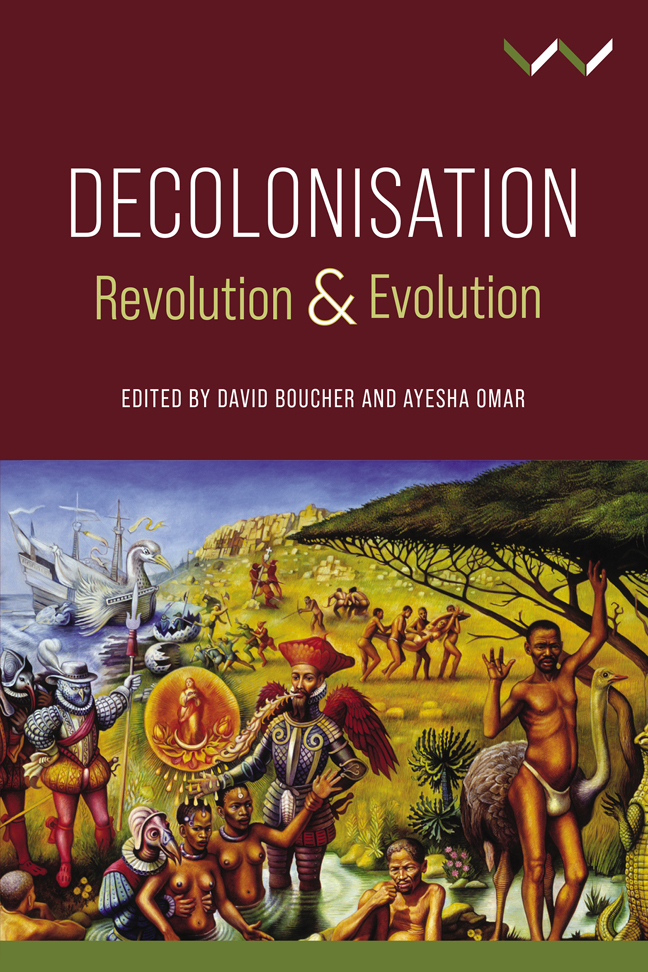Book contents
- Frontmatter
- Contents
- Acronyms
- Introduction: Decolonisation: Interdisciplinary Perspectives
- Chapter 1 The Invention of Blacks: Notes on Conquest, Fear and Time
- Chapter 2 The Decolonisation of Southern Africa: Historical Reflections
- Chapter 3 The Border of Trust at Kat River for Coloured Settlers, 1851–1853
- Chapter 4 Decolonisation and the Enduring Legacy of Colonial Borders in Africa
- Chapter 5 Fanon's Challenge: Identity, Recognition and Ideology
- Chapter 6 Beyond Redemption: Unsettling Progressive-Romantic Storyings of Colonial Injustice in Western Critical Thought
- Chapter 7 The Limits of Decolonisation and the Problem of Legitimacy
- Chapter 8 Decolonisation – Real and Imagined
- Chapter 9 Decolonisation and the Crisis of African Literature in the Twenty-First Century
- Chapter 10 Pedagogical Disobedience in an Era of Unfinished Decolonisation
- Contributors
- Index
Chapter 9 - Decolonisation and the Crisis of African Literature in the Twenty-First Century
Published online by Cambridge University Press: 01 March 2024
- Frontmatter
- Contents
- Acronyms
- Introduction: Decolonisation: Interdisciplinary Perspectives
- Chapter 1 The Invention of Blacks: Notes on Conquest, Fear and Time
- Chapter 2 The Decolonisation of Southern Africa: Historical Reflections
- Chapter 3 The Border of Trust at Kat River for Coloured Settlers, 1851–1853
- Chapter 4 Decolonisation and the Enduring Legacy of Colonial Borders in Africa
- Chapter 5 Fanon's Challenge: Identity, Recognition and Ideology
- Chapter 6 Beyond Redemption: Unsettling Progressive-Romantic Storyings of Colonial Injustice in Western Critical Thought
- Chapter 7 The Limits of Decolonisation and the Problem of Legitimacy
- Chapter 8 Decolonisation – Real and Imagined
- Chapter 9 Decolonisation and the Crisis of African Literature in the Twenty-First Century
- Chapter 10 Pedagogical Disobedience in an Era of Unfinished Decolonisation
- Contributors
- Index
Summary
I would like to begin with the question: how much of African literature in European languages is decolonised today, decades after flag independence? Or, to put it in a more elaborate way, to what extent has African literature in European languages demonstrated its independence from the colonial hegemonies that enabled its existence, years after efforts to gain cultural, intellectual and epistemological self-determination and self-sufficiency? Rather than an answer, a yet more disturbing question follows: will African literature ever attain that status of decolonisation whereby its sources and resources (in terms of aesthetics, reception, ideological positionality, among others) are rooted in African indigenous epistemologies, from where the literature can reach the global literary markets?
These questions should bother us, given this age of cultural exploits, expansionism and transnationalism promoted by globalisation. They have in fact provoked the discussion that follows in this chapter about the fate of African literature in the twenty-first century. The impulse to frame this fate in the form of a crisis rests on the hypothetical contention that the production of literary works – including discourse on them – in Africa today appears to be overdetermined by Western factors, which have come to have a strong hold on the literature under the guise of universalism. Although these factors may not be new, since the literature itself is a product of Western colonialism, their greater control of the literature in the twenty-first century, accentuated by what has come to be known as the new African diaspora, strongly undermines efforts that have been made towards decolonising African cultural and literary production. These factors include the ways in which the West views and shapes the conception, production and reception of African literature within the frame of what I would like to see as the ontological rationality of migration. The condition of possibility for these Western factors having so much grip on African literature, which, in my view, should constitute greater worries, is made up of the following realities in many parts of Africa: the rather wilful neglect of educational and cultural institutions, the collapse of conventional publishing, declining readership as a result of increasing levels of poverty, and the sheer drive, especially among the younger generation of writers and artists, to emigrate to the West.
- Type
- Chapter
- Information
- DecolonisationRevolution and Evolution, pp. 211 - 230Publisher: Wits University PressPrint publication year: 2023



